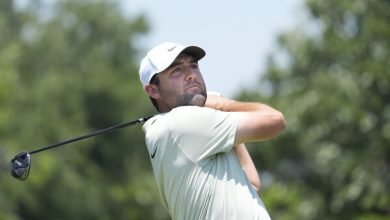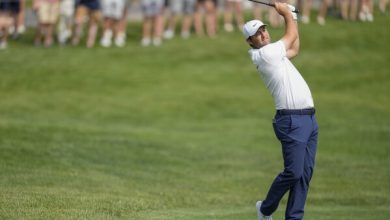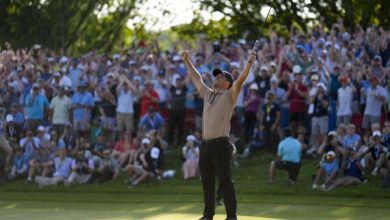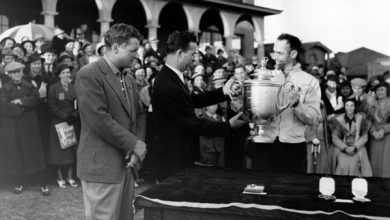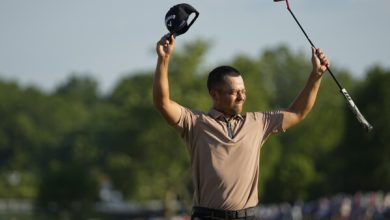US OPEN ’24: Payne Stewart indelibly linked to Pinehurst
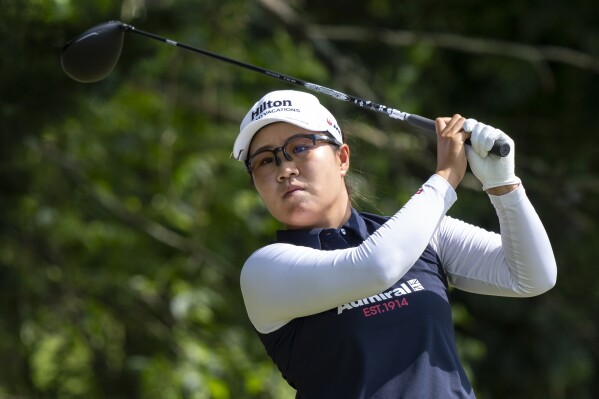
US OPEN ’24: Payne Stewart indelibly linked to Pinehurst
Pinehurst No. 2 in the sandhills region of North Carolina has 117 years of golf history behind it. That includes a PGA Championship not many remember, a Ryder Cup before anyone cared and one U.S. Open champion no one can forget.
No trip to Pinehurst No. 2 is complete without posing with the statue of Payne Stewart striking as famous a pose as any in U.S. Open history — left leg planted, right arm thrust forward after he holed a 15-foot par putt on the 18th hole for a one-shot victory over Phil Mickelson.
It’s hard to go to Pinehurst without thinking about Payne.
Any trip would be emotional for his children, especially the 25-year anniversary of his 1999 U.S. Open title, which came four months before Stewart, three associates and both pilots perished in a freak plane crash.
Chelsea Stewart O’Brien was 13 when her father died and now is a mother of two working in strategic partnerships for AT&T. She once wrote that milestone events were the hardest — the anniversary of his U.S. Open win, the plane crash on Oct. 25, 1999, weddings, births.
This week feels different.
“He had such a flair and a joy for life that it’s easy to celebrate him,” she said. “I think as we’ve grown, and our families have grown, we’re trying to remember and instill in our children all he stood for. Now it’s quite an honor to celebrate all he accomplished and the man he was.”
She has been back to Pinehurst, most recently when Stewart was posthumously given the Bob Jones Award. So has Aaron Stewart, who was 10 when his father died. He played Pinehurst No. 2 in the fabled North & South Amateur in 2009, even using his dad’s former caddie (Mike Hicks) and the yardage book from that 1999 U.S. Open.
“Obviously, next week being the 25th anniversary of Dad’s win at Pinehurst has special significance,” said Stewart, who has two young sons and is vice president of sports marketing for Hilton Grand Vacations. Among other things, he runs the LPGA season opener.
“Pinehurst has been different over the years for me,” he said. “There were a few summers I played in the North & South Amateur and competed on the course. Overall, Pinehurst is a special place and a special village. It just means more.
“All the stuff they’re doing to honor Dad and his win is just icing on top of a special place,” he said. “It’s going to be an emotional week, for sure.”
Their mother, Tracey, will be joining them. None of them was there in 1999 when Stewart won his third major, and by far his most famous. He had his trademark knickers and tam o’shanter cap. It was raining, and he ripped out the sleeves of his rain jacket for more freedom in his sweet, fluid swing.
Tiger Woods was charging. Mickelson was leading. Stewart, chomping away on his gum, made a 25-foot par putt on the 16th to tie for the lead, a 3-foot birdie putt on the par-3 17th to take the lead and that 15-foot par putt on the 18th to win it.
His reaction — now captured by the statue — still rates among the most memorable in the U.S. Open with Tom Watson’s running toward the 17th hole at Pebble Beach when he chipped in, Hale Irwin racing around the 18th green high-fiving fans at Medinah, Woods pumping his arms after his tying birdie putt at Torrey Pines.
“Payne was one of those dramatic individuals,” longtime friend Peter Jacobsen said. “He made such an impression on the course and off the course. He had a distinctive style, he was a flamboyant dresser. He was recognizable everywhere.”
The statue is being moved for the U.S. Open, and that’s a good thing. The USGA wanted better access to it, so it will be relocated from the back of the 18th green to near the entrance, giving spectators a chance to see it and pose with it.
“They been incredible partners to our family,” Ms. Stewart O’Brien said. “It’s really neat what they’ve done. We’ve been honored to have them think so highly of our dad and have him remembered in that way.”
There are ceremonies and other functions planned early in the week — Jacobsen will be the emcee for one of them — and Monday marks the launch of a new Payne Stewart Collection clothing line. Yes, it will include a rain vest as part of his wardrobe from that Sunday in 1999.
“No scissors needed,” Aaron Stewart said.
They were producing a catalog for the clothing — knickers and the cap are among the items, but also shorts and sweaters and pants — and they needed a cover. Aaron Stewart agreed to be the model, going to Pinehurst recently to dress in slacks and an argyle sweater.
He struck a familiar pose. Very familiar.
“It was kind of eerie how much he looked like Dad in a couple of pictures,” his sister said.
“It was quite the spectacle to see,” Aaron Stewart said. “That was on a normal day at Pinehurst. People were walking by and there were a lot of eyeballs.”
Stewart died at age 42, just four months after that U.S. Open title that remains so memorable, and a month after the U.S rallied to win the Ryder Cup at The Country Club in Brookline, Massachusetts.
That was another big moment.
“Everything he did was in a big way,” Jacobsen said.
The cup was decided and Stewart was on the verge of earning a halve against Colin Montgomerie. The heckling, already ruthless and relentless, reached a point that Stewart walked over and picked up the Scot’s marker to concede the match.
Perhaps it’s no wonder Stewart lives as large in death.
The Payne Stewart Family Foundation includes golf camps for lower income families. The PGA Tour began the Payne Stewart Award, which has become the most prestigious of all for players. Mrs. Stewart and her children attend in Atlanta each year during the Tour Championship in what always is an emotional night.
Scottie Scheffler has been the last few years. He was asked this week for the first thing to come to mind when he hears Stewart’s name.
“Either his putt at Pinehurst, and then the Payne Stewart Award is something I always try to go to at East Lake,” Scheffler said. “His legacy and seeing his family there is always really special. He did a lot for the communities that we play in across the country, and he was really an inspirational guy that I look up to as a player just because of the impact he was able to have off the golf course as well.”
___
. .
